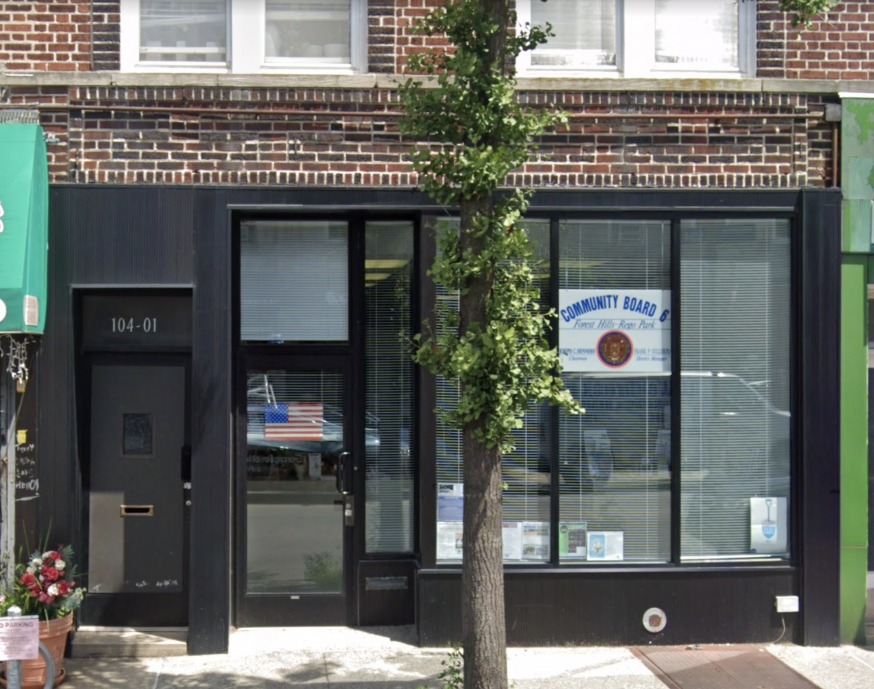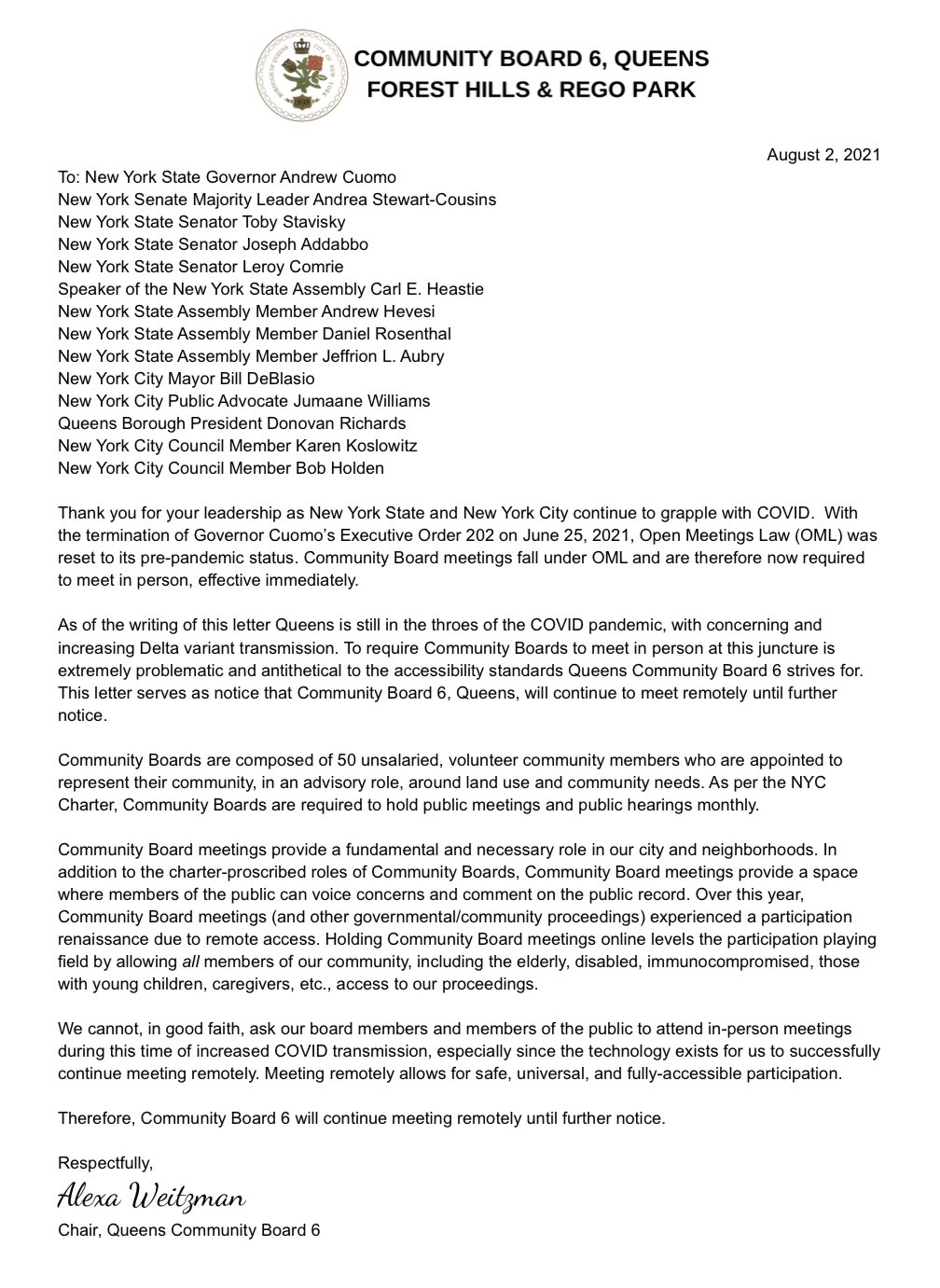
Queens Community Board 6 Office in Forest Hills (Google Maps)
Aug. 5, 2021 By Allie Griffin
Community board meetings across the city must now be held in person — but one Queens board is refusing to do so given the growing prevalence of the delta variant.
The boards have been required to hold in-person meetings since June 25, when Governor Andrew Cuomo ended his executive order declaring a state of emergency due to COVID-19.
The expiration has meant that meetings must again be hosted for the public to witness in-person, as part of the state’s Open Meetings Law (OML).
But the leaders of Queens Community Board 6 (CB6)—which covers Forest Hills and Rego Park—do not agree with the change. The board will instead continue to hold its meetings remotely until further notice due to concerns over the highly contagious delta variant, Chair Alexa Weitzman stated in a letter to elected officials Monday.
“As of the writing of this letter, Queens is still in the throes of the COVID pandemic, with concerning and increasing Delta variant transmission,” Weitzman wrote. “To require Community Boards to meet in person at this juncture is extremely problematic and antithetical to the accessibility standards Queens Community Board 6 strives for.”
Most community boards, like Queens CB6, are on summer break and are not hosting monthly board meetings in July and August.
However, a Manhattan community board, Manhattan CB2, hosted a full board meeting in person on July 26 and subsequently had to cancel all meetings scheduled for the week of Aug. 2 after two fully-vaccinated attendees tested positive for COVID-19.
Weitzman told the Queens Post that what happened at the Manhattan Community Board 2 meeting is exactly why she and other CB6 board members will refuse to shift meetings to in person.
“The two cases at Community Board 2 in Manhattan really spurred me to take action early this morning,” she said Monday after posting her letter on Twitter.
The same situation could have easily happened with Queens Community Board 6, she said, since the board holds its meetings in a small room at 80-02 Kew Gardens Rd. She said she is unaware of a meeting space in the district that could safely accommodate all its board members and the public.
“I know our community and I know the spaces that we have — we don’t have a space that would be able to accommodate the 50-person membership safely,” Weitzman said.
It would be impossible to adhere to the city’s six-feet social distancing rule with the 50 board members alone, she added.
Many board members and members of the public have reached out to her with concerns about returning to in-person meetings—even before the delta variant raised alarm.
“We have older members, we have younger members who are immunocompromised, we have people who have children who are not eligible for the vaccine yet — I’m in that category —, we have people with accessibility issues that it would be very difficult for them to be in person,” Weitzman said. “The executive order might have ended, but the pandemic is not over.”
She also said it’s important to remember that community board members are unsalaried volunteers and as such, should not be required to put themselves at risk of contracting the coronavirus for the sake of hosting meetings in person.
Furthermore, Weitzman said, Queens CB6 has held remote meetings with much success.
Since switching to remote meetings, participation and engagement from the public has increased, she said. Given the greater participation, the board has created a process where members of the public can apply to sit on a committee.
Weitzman said the Open Meetings Law requiring in-person meetings should not apply so broadly, given the pandemic. She said that a blanket approach does not make sense.
The state legislature, however, would have to pass legislation to adapt the law to allow for remote meetings to continue.
“This is uncharted territory, so I understand that laws meant to govern in pre-COVID times [now] don’t fit neatly, but that’s on the legislature to figure out how to fix this problem because it’s a big one,” Weitzman said.
Two state legislators have introduced a bill that would allow public bodies like community boards the flexibility to either continue to hold virtual meetings or hold a hybrid of in-person/virtual meetings in accordance with the Open Meetings Law.
State Sen. Brad Hoylman introduced the bill in the State Senate last month and Assembly Member Amy Paulin introduced it in the Assembly in June. It has yet to be brought to the floor for a vote since the legislature is currently not in session. However, there appears to be growing support for it among legislators.
Assembly Member Andrew Hevesi said he intends to sign onto the bill as a co-sponsor when questioned by Weitzman on Twitter.
Several elected officials have also said they support community boards meeting remotely since Weitzman made her letter public.
Assembly Member Daniel Rosenthal agreed with Community Board 6’s decision to continue meetings remotely until further notice as well.
“@QueensCB6 is right,” Rosenthal said in a tweet. “With the growing threat of the Delta variant Community Board members should have the option of attending meetings remotely.”
Queens Borough President Donovan Richards — who appoints community board members — urged the state legislature to revise the Open Meetings Law for the duration of the pandemic.
“I support the Community Board’s wishes for an option to meet remotely,” Richards said in a statement. “Amid the rise of the Delta variant, it is more important than ever we keep our public servants safe and a hybrid model at the very least is a good compromise.”

